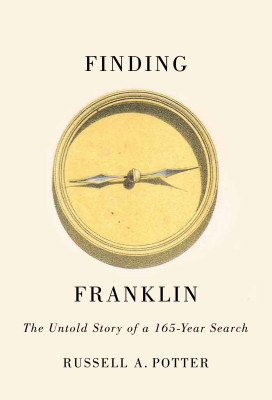Sir John Franklin, in case you haven’t heard, searched for the Northwest Passage. When he, his ships, the Erebus and Terror, and all his men disappeared circa 1850 in what would become the Canadian Arctic, others set out to search for them. When the survival of the expedition’s men became hopeless, that search morphed into yet another search – for the clues scattered in the landscape and preserved in Inuk recollections that might reveal how, why, when, and where these men had perished. New searchers then stumbled across evidence of old searchers, who became their own source of historical curiosity. And now Russell A. Potter has concluded a search for evidence and meaning in these nested matryoshka dolls of arctic and armchair endeavour.
As Potter aptly describes, the desire to solve the mystery of the Franklin expedition’s loss has infected investigators like a virus. Potter himself has been seized by this infection, but he is still able to record the patient histories of those swept up in a contagion that has produced outbreaks for more than a century and a half. The discovery of the Erebus wreck in September 2014 has further fuelled the pandemic, perhaps to its greatest heights. We are fortunate that Potter has compiled such fascinating case histories.

Finding Franklin
The Untold Story of a 165-Year Search
Russell A. Potter
McGill-Queen’s University Press
$39.95
cloth
280pp
9780773547841
Potter has planted his own boots in the Canadian north and is an experienced hand at arctic exploration history. He was a historical advisor to Arctic Ghost Ship, the 2015 PBS NOVA version of the documentary on the Erebus discovery. More importantly, as a professor of English and Media Studies at Rhode Island College, he understands the Franklin tragedy and the many, many searches from a cultural perspective. The searchers themselves (with sometimes unhappy endings, including poisoning and suicide) are as much of interest in this book as the object of their searches. Potter is prepared to wade into the evidence, which, to a non-Franklin enthusiast, may sometimes prove to be more than they are looking for, but otherwise he is engaging, interweaving his experience with solid research. It helps tremendously that he is a capable narrator, a skill he demonstrated in a well-received recent novel, Pyg.
The Franklin mystery will always be a mystery. As Potter shows so well, its meta-narrative will only continue to expand with every new theorist or searcher to appear and every new clue to be uncovered. mRb






0 Comments